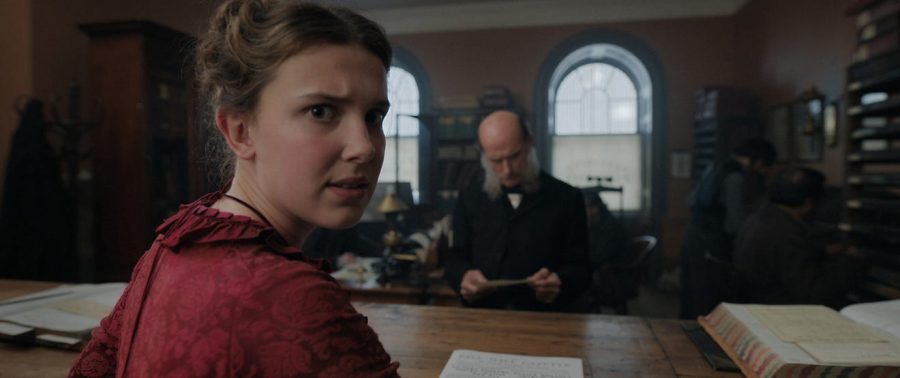Once again, the game is afoot! It seems audiences simply can’t get enough of the Holmes family and their crime-solving escapades, even when venturing outside the established canon as in the new Netflix movie-based-on-a-book “Enola Holmes.”
In this latest adaptation of Sir Arthur Conan Doyle’s timeless novels, the eccentric Sherlock and bureaucratic Mycroft Holmes take a backseat to their mischievous younger sister and the titular character, Enola Holmes (no Benedict Cumberbatch this time—we’re sad, too). A mystery unravels all the same when Enola’s mother Eudoria goes missing, and her search for the truth behind her mother’s disappearance makes for a cheeky and imaginative take on the classic detective story, playing with our preconceived notions of the Sherlock Holmes formula. Sadly, however, the film doesn’t do much else, at least not effectively.
One thing the film does get right is surface appeal. With gorgeous panoramic shots of the English countryside, genre-typical high-speed train sequences and realistic British accents (most of the cast is British), “Enola” is riveting to watch and even more enjoyable with friends. This is especially true during scenes focused on Enola’s detective skills, which are orchestrated with mentally stimulating special effects and without over-the-top theatrics. Additionally, the lively music during the opening montage will put you in an unquestionably good mood, and the film remains surprisingly upbeat and optimistic even during its more grim and emotional segments. It’s simply a nice-looking and pleasant-sounding movie, no question.
Even better, “Stranger Things” starlet Millie Bobby Brown plays a wonderful and confident Enola, taking the lead role in stride like an actress with twice her experience. However, she’s painful to watch in some key scenes that are narrated rather than acted. Her monologues addressed directly to the audience are meant to convey a cheeky “Jim Halpert staring directly into the camera” vibe—complete with overexaggerated facial expressions, à la Debby Ryan TikTok—but her narration falls short of endearing and lands squarely on awkward and contrived—again, à la Debby Ryan. A friend I watched the film with remarked that it felt like “Dora the Explorer,” and I couldn’t help but agree when confronted with Brown literally turning to the camera to ask the audience, “Do you have any ideas?”
But I’d be remiss if I let Brown’s commanding presence on screen distract me from other top-notch casting choices. Henry Cavill plays a brooding Sherlock—so brooding, in fact, that the Conan Doyle estate sued Netflix for giving the typically sociopathic character “too much emotion” on screen—and Sam Claflin’s amusingly stuffy Mycroft creates the brotherly dynamic we’ve all come to expect after watching BBC’s “Sherlock.” While she unfortunately doesn’t get much screen time, Helena Bonham-Carter also expertly portrays the perfectly unconventional, mysterious and motherly Eudoria.
It’s a shame that such a superstar cast was wasted on a film that ties itself in knots on its journey to arrive at a meaningful moral takeaway. We learn early on that Enola’s main life philosophies come from her mother, who preached the importance of independence in finding your life’s path—hence her being named Enola, which spells “alone” backwards. The heartwarming backstory scenes that build to this moment set the stage for the film to deliver a message about individualism and self-discovery, but then a secondary plot centered on aristocratic intrigue and a missing marquess appears out of almost nowhere and pulls the focus in new directions.
An important 1884 voting reform bill in England then takes center stage as Enola’s search leads her to new moral messages about feminism and political participation. However, right when these ideas seem to be approaching the level of refinement needed for general dissemination, consumption and appreciation, the film shifts gears back to the first theme and returns to the story of Enola’s search for her mother, with a weird yet predictable twist ending that threatens to nullify all of Enola’s efforts to become her own woman.
What this means is that “Enola Holmes” could have delivered an intelligent message about heroic individualism, or it could have mused insightfully on the role of women in a society that doesn’t value their opinions (the film takes place pre-women’s suffrage in England). But because it tries to do both, it trips over its own shoelaces. We, as viewers, walk away confused, wondering what the moral of the story was actually supposed to be, or if there even was one at all.
To make matters worse, the film’s failure to realize this major misfire transforms its once cheeky self-confidence from an endearing sincerity to a patronizing and smug childishness. It addresses us in finality like we should have learned something, but then we feel vaguely guilty that we don’t really know what that something was supposed to be.
Perhaps this makes “Enola Holmes” itself the greatest unsolved Holmes mystery yet. But if you need Sherlock-level deduction skills to figure out what a film might be trying to tell you, maybe the film took a wrong turn somewhere. We can only wonder what Watson would think.






